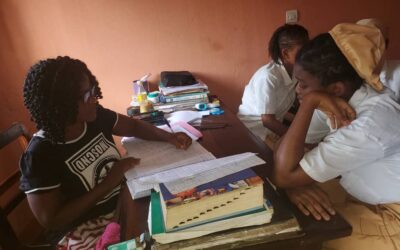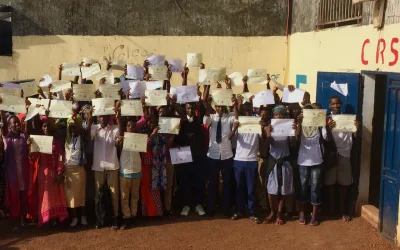This week is Refugee Week in the UK. Attention is understandably focused on two issues: the inhumane treatment of refugees flees Syria and crossing the Mediterranean and the social and economic impact of refugees, or asylum seekers, in the UK. It is easy to overlook that being a refugee affects lives for many years after a conflict has ended.
The disastrous impact of Ebola in West Africa can be traced back to the failure to develop in the region after the wars of the previous two decades. A conference organised by The African Research Institute in London next week asks how we can ensure that economic development of the region helps those at the bottom of the pile. Solutions to long term development problems are complex and contested but any solution needs to address the underlying issue of our, The West’s, chronic attention deficit.
Support now has an obvious imperative: images of war zones, families fleeing homes, men women and children injured and killed fill our screens and newspapers. But lasting change demands a longer attention span and a more complex solution.
FCRS provides ongoing and meaningful support to the refugee community in Conakry: education for the next generation, jobs with a living wage for the hardworking dedicated teachers, vocational training to supplement the academic and hope for the future for parents who have survived unimaginable suffering in their past.
Isaac Phillips Director of CRS reflects on what being a refugee means to him
I have gone through war-related violence and whenever I hear of war, strike or any form of instability I am confused and live with fear as I start to recall what has happened to me and whether it is about to happen again.
Students still try to come to school regardless of the prevailing situation. They are getting to know that power and authority lay in the use of pens and not guns.
Guns destroy but pens build.
Guns take lives but pens saves lives. Blessed are those who empower children in the use of the pen and cursed are those who teach adults in the use of guns on the harmless and innocent.
Teacher Alicious Sesey on how being a refugee has impacted and enriched his life
We are the sum total of all the choices we make. There is scarcely an hour of the day in which we are not called upon to make choices of one sort or another, trivial or far-reaching. We are all beset by choices. What time shall I get up to go to school or to go to bed? Whom shall I see or attend to – family, friends or children at school? Must I take the road to school? How much am I willing to give of myself or my time or my love? I become a trained and qualified teacher, yet I am a victim of circumstances of the senseless civil wars in Sierra Leone and Liberia. Unavoidably, we live in Guinea but our natural nationalities, Sierra Leoneans and Liberians, have been fused into one concept: “refugees”. Home again – when shall I see my home?
Retrospectively, the good old days are gone. Just as all life is adjustment and readjustment, so all choices to some extent must be compromised between reality and a dream of perfection. My choice and decision to work with the Conakry Reliance School does not demand any impossibility. I enjoy the pleasure of working at CRS, because the children need me. Until you try you will never get the result of a risk that is worth taking.
I have discovered potential in children. They are friendly, respectful and eager to learn, even when hungry teachers feel they are at the edge of a cliff, the children entertain us during their lunch time (and thank you, Friends of the Conakry Reliance School in England, for supporting the feeding program which the children have named ITEM 13!).
The atmosphere of solidarity amongst the teachers, the administration and the children make everyone part of the Conakry Reliance School family. Prompt and timely intervention was paramount. This spirit of oneness erodes one’s distress and bitterness. This is very rare in other schools. I fashion for myself a life that does not fret over what is past and gone, in spite of all that is left behind. I live and work with CRS each day as if my life has just begun.
Teaching at CRS means you are seen as a father to the pupils and as such renders financial assistance to them when the need arises, mainly in the form of help with transport to and from school. Thanks to FCRS for setting up a library in the school. However, teachers lack some basic modern books and instructional materials, ie laboratory and teaching aids. Teachers often go in search of some of these materials at the expense of their meagre salary.
Teachers do earn a very low salary which can neither be measured up to the demand of the economic situation in this country nor the amount of time and obligation discharged by teachers on each school day.
Teaching at CRS means making sacrifices but it is worthwhile in order to help the children who are all victims of circumstances they did not create.


